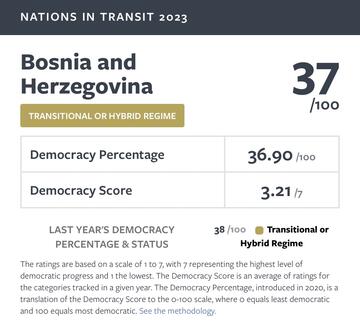
The consociational model in Bosnia and Herzegovina (BiH), for this report, despite international involvement, does not represent a model of democracy but rather a hybrid regime with a democracy score of 3.21 out of 7. Dominated by autarchic and ethnonationalist leaders, the system saw the establishment of three parallel ethnic societies within one state. The 2022 general elections showcased these autocratic and nationalist inclinations, due to the penetrating influence of the parties over the local electoral boards.
BiH's candidacy for EU membership, granted in December, occurred despite failing to meet most of the key priorities outlined by the European Commission. Political divisions, such as Republika Srpska's parties boycott of state institutions, delayed policy dialogues with the EU. This kind of institutional crisis also stalled the process of joining NATO. Efforts by the EU and US to revise the constitution and election laws failed. This has kept the country's legal framework definitely not aligned with European human rights standards. UN High Representative Christian Schmidt for Bosnia and Herzegovina enacted some controversial amendments to the constitution and election law after the 2022 general elections, evoking mixed reactions from political parties and international actors. The judiciary's independence and impartiality remained problematic, impacting the fight against corruption and organised crime. For instance, the new state prosecutor was elected after other candidates were disqualified. Legislation protecting fundamental rights is in place, but practices vary among the two entities in the federation. There are also laws created to protect minorities, but still discrimination targets certain groups, particularly Roma people and migrants.
Particularly interesting and concerning is the paragraph regarding the Independent media that scored just 3.25 out of 7 points for the year 2022. In 2022, the media market in Bosnia and Herzegovina remained oversaturated, with a worrying dependency of the media outlets on the government that could exercise its influence. Journalists faced, not only, pressures from political actors but also from media editors. The study underlines a 40% increase of political and verbal threats to journalists compared to 2021 and just in one year 30 verbal and physical attacks took place. A concerning aspect as well is the rarity with which authorities investigated these cases. Public service broadcasters share the market with numerous private media outlets, but their reliance on public funding makes them vulnerable to political pressure. Despite challenges, outlets like the Center for Investigative Reporting, Žurnal, and Inforadar provide independent investigative journalism. The lack of online content filtering facilitates the spreading of fake news and disinformation. Strategic lawsuits against public participation (SLAPPs) are a serious threat towards the financial sustainability of the media outlet and often leads to self-censorship. BiH's courts and prosecutor's office do not abide by transparency regulations by frequently disregarding access-to-information requests.
Tags: Bosnia Herzegovina Rule of Law Media freedomThe content of this article can be used according to the terms of Creative Commons: Attribution-NonCommercial 4.0 International (CC BY-NC 4.0) . To do so use the the wording "this article was originally published on the Resource Centre on Media Freedom in Europe" including a direct active link to the original article page.

